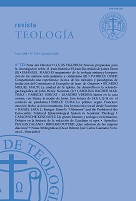Enrique Dussel's "Otherness" and the Problem of the Euro-centric Totalized Epistemological System in Academic Theology
DOI:
https://doi.org/10.46553/teo.57.133.2020.p159-182Keywords:
Dussel, Otherness, Modernity, Levinas, Asymmetrical Problem, Post-colonial TurnAbstract
The article deeps into the thought of Dr. Enrique Dussel (La Paz, Mendoza, Argentina, 1934) in order to demonstrate that modern academic thought in the global north (theological thought included, naturally) is highly euro-centric, cognitive-centric and naive about its self-placed position of authority and superio- rity regarding theological knowledge from the global south, which constitutes its Other. It explores Dussel's thought about Modernity and refers to the totalization of the Euro-centrical model. In order to deal with what Dussel calls «the conquering vocation of the system», inspiration is found on the Levinasian philosophy of the Other and on an approach to the «asymmetrical problem» that stresses the need for a post-colonial turn against the empire of Euro-centric reason, while recognizing the Other as a revelatory epiphany.Downloads
References
Boatca, Manuel, Global inequalities beyond occidentalism. Farnham: Union Road, 2015
De Las Casas, Bartolomé, Brevísima relación de la destrucción de las Indias V. Madrid: BAE
De las Casas, Bartolomé, De único Modo de atraer a todos los pueblos a la verdadera religión (1536) 6:3. México: FCE, 1975.
De Las Casas, Bartolomé, De Unico Vocationis Modo - Obras Completas. Madrid: Alianza Editorial, II, 1990.
De Sousa Santos, Boaventura, Una Epistemología del Sur: La reinvención del conocimiento y la emancipación social. México: Siglo XXI: CLACSO, 2009.
De Torquemada, Juan, Monarquía Indiana. Mexico DF: UNAM, 4, 1975.
Díaz del Castillo, Bernal, Verdadera Historia de Los Sucesos de la Nueva España. Madrid: Biblioteca de Autores Españoles, 1947.
Dussel, Enrique. «Descolonización Epistemológica de la Teología», Con- cilium 350/2 (2013): 23-34.
Dussel, Enrique. Ethics of Liberation in the Age of Globalization and Ex- clusion. Durkham and London: Duke University Press, 2013.
Dussel, Enrique, «Ética de la Liberación: Hipótesis Fundamentales», Concilium 192 (1984).
Dussel, Enrique. Filosofía de la Cultura y la Liberación. Ciudad de México: Universidad Autónoma de la Ciudad de México, 2006.
Dussel, Enrique. Introducción a la Filosofía de la Liberación. Bogotá: Editorial Nueva América, 1995.
Dussel, Enrique. «La cristiandad moderna ante el otro: del indio rudo al bon sauvage», Concilium 150 (1979): 498-506.
Dussel, Enrique y Guillot, Daniel. Liberación Latinoamericana y Em- manuel Levinas. Buenos Aires: Editorial BONUM, 1975.
Dussel, Enrique. Philosophy of Liberation. New York: Orbis Books, 1985.
Dussel, Enrique. The Invention of the Americas: Eclipse of the Other and the Myth of Modernity. New York: The Continuum Publishing Company, 1995.
Freire, Paulo. El Grito Manso. Buenos Aires: Ediciones Siglo XXI, 2003.
Hegel, G. W. F.. Sammtliche Werke, Appendix C. Hamburg: Meiner, 1995.
Hegel, G. W. F. The Philosophy of History. New York: Colonial Press, 1900.
Kader, Cemzade. «The Self and the Other in the Philosophy of Levinas», Mediterrean Journal of Humanities 7/2 (2017).
Kant, Emmanuel. Was heisst Aufklarung?, A. A. Konigsberg: 1784.
Levinas, Emmanuel. Philosophy, Justice, and Love. New York: Colum- bia University Press, 1998.
Myers, Kathleen Ann. Fernandez de Oviedo's Chronicle of America: A new history for a new world. Austin: University of Texas Press, 2007.
Simmons, William Paul. «The Third: Levinas' Theoretical move from an-archical ethics to the realm of justice and politics», Philosophy & Social Criticism 25/6 (1999): 83-104.
Schultz, Michael. «La presencia de G.W.F. Hegel en representantes de la filosofía latinoamericana (L. Zea, A. Roig, E. Dussel, I. Ellacuría)», Contrastes 19 (2014).
Downloads
Published
How to Cite
Issue
Section
License
Copyright (c) 2020 Teología

This work is licensed under a Creative Commons Attribution-NonCommercial-ShareAlike 4.0 International License.


















 Teología
Teología